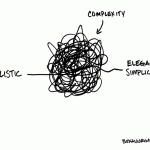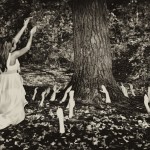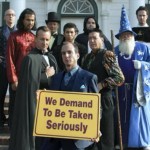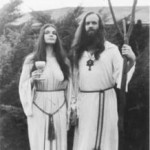 Syfy’s Magician series premiers next Monday, January 25. However, there was a special showing of the first episode last month, and it can also be watched online now. The television series is based on Lev Grossman’s Magicians trilogy — of which I am a huge fan. I tell people that Grossman’s Magicians is like “Harry Potter for grownups.” Yes, there’s sex and drugs, but more importantly, unlike Harry Potter, the protagonists are deeply flawed people. Grossman’s Magicians is as much about the characters’ struggle to become real adults, as it is about shooting fireballs out of their fingertips.
Syfy’s Magician series premiers next Monday, January 25. However, there was a special showing of the first episode last month, and it can also be watched online now. The television series is based on Lev Grossman’s Magicians trilogy — of which I am a huge fan. I tell people that Grossman’s Magicians is like “Harry Potter for grownups.” Yes, there’s sex and drugs, but more importantly, unlike Harry Potter, the protagonists are deeply flawed people. Grossman’s Magicians is as much about the characters’ struggle to become real adults, as it is about shooting fireballs out of their fingertips.
I was not greatly impressed with the first episode of the Syfy series, though. Probably like many Grossman fans, I was perturbed by what seemed like gratuitous changes from the book’s narrative. But more than that, I was bothered that the first episode rushed through about about half of the first book in less than an hour, leaving little time for character development. And the screenwriters seemed overly anxious to introduce the mysterious antagonist called the “Beast.” I am anxiously awaiting the second episode. I’m interested to see if the story goes deeper than the confrontation with an external enemy — because, while Grossman’s novels have that, the real story is not about an external struggle, but an internal one.
Magic in The Magicians
At its core, Grossman’s Magicians series is about the emptiness of mundane life and how we try to escape from it. In The Magicians, Grossman enables bright but socially awkward Quentin to escape the mundane world, quite literally — first to a magical college called “Brakebills” and then to another Narnia-like dimension called “Fillory.” In both instances, Quentin fails to realize that he cannot escape the emptiness he is carrying within himself.
 At first, when Quentin is transported to Brakebills, he is in nerd-heaven. Magic is real and he is going to be a magician. Magic is hard, both mentally and physically, but Quentin loves it all the more.
At first, when Quentin is transported to Brakebills, he is in nerd-heaven. Magic is real and he is going to be a magician. Magic is hard, both mentally and physically, but Quentin loves it all the more.
“In Brooklyn reality had been empty and meaningless—whatever inferior stuff it was made of, meaning had refused to adhere to it. Brakebills was different. It mattered. Meaning—is that what magic was?—was everywhere here.”
But eventually, Quentin finds himself unsatisfied and unhappy. The more he is able to bend physical reality to his will, the more desperate he becomes. “Wasn’t there a spell for making yourself happy?” he wonders.
Magic, for Quentin, has become disenchanted. It becomes a mere technology. It becomes mundane. He longs for purpose, for meaning. And he doggedly looks for it outside of himself. He longs for an adventure, a quest, a great evil to fight — all forms of meaning exterior to himself. Specifically, Quentin longs for Fillory, the fictional world of the fantasy novels of his childhood, which resembles C.S. Lewis’ Narnia. In short, he longs for magic, which is of course ironic, because technically he is a magician. But the magic of Fillory, which Quentin longs for, is not the technological magic of Brakebills, but more of a “religious” magic — the magic of meaning.
Counterintuitively, the magic Quentin learns gets in the way of his finding the magic he needs. Being magicians, Quentin and his friends never really have to grow up. “Can a man who can cast a spell ever really grow up?” muses the Brakebills headmaster. And, upon graduation, the characters proceed to squander their gifts, and their lives. Because they are magicians, they never have to face hard, unyielding reality … until they do.
Ironically they discover it in the fantasy world of Fillory, which turns out to be a real place, with real danger, and (as Fillory’s Aslan-like ram-god, Ember, instructs them) not just a theme park created for their entertainment. And when enough people have been hurt and enough people have died, Quentin comes to face the fact that he cannot escape himself or the gaping hole in his soul. No magic, no other world, will fix it. Right before the climax, Quentin’s girlfriend, Alice, challenges him:
“Stop looking for the next secret door that is going to lead you to your real life. Stop waiting. This is it: there’s nothing else. It’s here, and you’d better decide to enjoy it or you’re going to be miserable wherever you go, for the rest of your life, forever.”
But it is not until the sequel, The Magician King, that Quentin learns the lesson that he did not learn in the first book: that the sense of meaning that he longs for is not to be found in learning magical spells or in other magical worlds, but in an inner transformation. At the end of the book, Quentin is standing literally on the precipice of yet another (even more) magical world, when he finally understands that the change he needs is not a change of external geography, but a change in the internal geography of his soul.
Magicians in Paganism
Many Neo-Pagans practice some form of magic or “magick” (as it is sometimes spelled), although the term “magic” is used in different ways by different Pagans. For some, “magic” describes practices which seek to project the magician’s will on the natural world by supernatural or occult means. For others, “magic” is a kind of psychological technique for self-empowerment. And still, for others, “magic” refers to a “re-enchantment” of the world, a transformation of our consciousness and our relationship with the natural world.
I wonder how many of us who come to contemporary Paganism looking for “magic” are like Quentin. We want power — specifically the power to change our circumstances. Take for example, Alex Mar’s recently published memoir, Witches of America, in which she describes her investigation of a contemporary witchcraft group in terms her desire for “access” to the kind of power suspects some witches of having.
But it’s not power that we lack today — it’s meaning. We live in a world today that is magical by the standards of a century ago. As science fiction author, Arthur C. Clark, wrote, “Any sufficiently advanced technology is indistinguishable from magic.” But we don’t experience our technologies as magic, because technology is not real magic. This becomes clear in Grossman’s novels: As magic becomes for Quentin a mere technology for manipulating his environment, it becomes disenchanted; it loses meaning.
 I have the same concern about the Pagan understanding of magic. Setting aside questions of its efficacy, I fear that our magic tends to become just another technology that contributes to the disenchantment of the world. Wouter Hanegraaff has argued that magic survived the Enlightenment by becoming itself disenchanted. Like any other technology, disenchanted or profane magic is a function of an isolated subject exerting his or her will on an objective, inert world. In contrast, enchanted or sacred magic is always function of a relation between two subjects, like Martin Buber’s “I-Thou”.
I have the same concern about the Pagan understanding of magic. Setting aside questions of its efficacy, I fear that our magic tends to become just another technology that contributes to the disenchantment of the world. Wouter Hanegraaff has argued that magic survived the Enlightenment by becoming itself disenchanted. Like any other technology, disenchanted or profane magic is a function of an isolated subject exerting his or her will on an objective, inert world. In contrast, enchanted or sacred magic is always function of a relation between two subjects, like Martin Buber’s “I-Thou”.
Or else magic becomes a form of escapism, another way of avoiding reality, as Starhawk warns in The Spiral Dance:
“If Goddess religion [and I would include Paganism generally] is not to become mindless idiocy, we must win clear of the tendency of magic to become superstition. … The value of magical metaphors is that through them we identify ourselves and connect with larger forces; we partake of the elements, the cosmic process, the movement of the stars. But if we use them for glib explanations and cheap categorizations, they narrow the mind instead of expanding it and reduce experience to a set of formulas that separate us from each other and our own power. …
“Fascination with the psychic — or the psychological — can be a dangerous sidetrack on any spiritual path. When inner visions become a way of escaping contact with others, we are better off simply watching television. When ‘expanded consciousness’ does not deepen our bonds with people and with life, it is worse than useless: It is spiritual self-destruction.”
Magic is Meaning
What’s the difference between magic and technology then? I think real magic isn’t something that is “used”; it is something that is experienced. As Leonard Cohen wrote, “Magic is no instrument; Magic is the end.” It is something that is available, in fact necessary, to us all, and yet as enigmatic and fleeting as a sunset. This is a different kind of magic from the profane or disenchanted magic that Quentin learns at Brakebills and which many Pagans study. It is the difference between magic as a technology, and magic as an encounter — an encounter with that something which gives life its vitality and its sense of meaningfulness. This is a magic which cannot be forced, a magic which exists in the intersection between longing and grace.
In addition, magic is meaningful, whereas technology is not. Magic, like meaning, is something that has be be believed in, while belief is irrelevant to technology. And, most importantly, while technology is external to us, magic has to come from within. Quentin seems to realize this finally in the third novel, The Magician’s World:
“He’d been right about the world, but he was wrong about himself. The world was a desert, but he was a magician, and to be a magician was to be a secret spring—a moving oasis. He wasn’t desolate, and he wasn’t empty. He was full of emotion, fill of feelings, bursting with them, and when it came down to it that’s what being a magician was. They weren’t ordinary feelings—they weren’t the tame, domesticated kind. Magic was wild feelings, the kind that escaped out of you and into the world and changed things. There was a lot of skill to it, and a lot of learning, and a lot of work, but that was where the power began: the power to enchant the world.”
If Syfy’s Magicians series goes the way of other television adaptations of complex novels, then it will be dumbed-down to a battle with an external evil and a hackneyed warning against meddling with powers one does not understand. In contrast, Lev Grossman’s Magicians trilogy serves as a different kind of cautionary tale for would-be magicians. It reminds us of the truth of those words which the mother of contemporary Paganism, Doreen Valiente, put into the mouth of the Goddess: “If that which you seek, you find not within yourself, you will never find it without.”
















